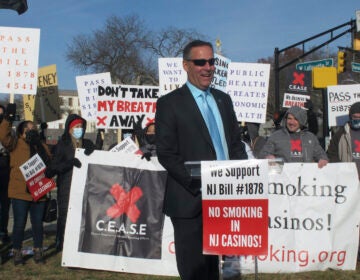New Jersey rethinks how it lures companies
Gov. Phil Murphy is bringing in an outsider to establish a “new culture” at the state Economic Development Authority.
Listen 4:38
Holtec International built a manufacturing facility in Camden, New Jersey, thanks to a $260 million tax break made possible by the state's Economic Opportunity Act. (Emma Lee/WHYY, file)

Gov. Phil Murphy is bringing in an outsider to establish a “new culture” at the state Economic Development Authority, an agency that was no stranger to controversy during the tenure of former Gov. Chris Christie as the size of state tax incentives grew to record highs.
Murphy announced Wednesday that Tim Sullivan, who currently is deputy commissioner of the Connecticut Department of Economic and Community Development, is his pick to lead the Trenton-based EDA as its chief executive officer.
Sullivan, a Bergen County native, is also a former top New York City economic-development official who served in the administration of former Mayor Michael Bloomberg.
As a gubernatorial candidate last year, Murphy made improving the state economy a top issue, and he often criticized the Christie administration’s economic-development efforts for being overly reliant on the tax-incentive programs administered by the EDA. Last week, Murphy signed an executive order that calls on the Office of the State Comptroller to conduct a full-scale performance review of the incentive programs.
In a statement issued yesterday as his administration announced the selection of Sullivan to lead the EDA, Murphy said “we need a new culture at EDA.”
“I am asking Tim (to) use his wealth of experience to help grow and strengthen our economy and make New Jersey an even better place for businesses to call home,” the governor said.
Christie’s former EDA chief executive, Melissa Orsen, stepped down in December, and the agency’s board could approve Sullivan at a public meeting as early as next month.
“I am honored to have the opportunity to join Governor Murphy’s cabinet and look forward to working with him to create an economy that is as exciting, innovative, and diverse as New Jersey,” Sullivan said in a statement provided by the Murphy administration.
The EDA is an agency that is “in but not of” the state Department of Treasury, and it operates with its own board and executive staff. Among the programs the agency administers are those that provide financing for small businesses, offer tax incentives to attract or retain jobs, and assist in redevelopment efforts. Christie also used the agency during his last year in office to issue debt to help finance a controversial renovation of the State House and the realignment of government office buildings in Trenton.
Audit raised questions
But it was his administration’s handling of the tax-incentive programs that drew the most attention during Christie’s eight years in office. Christie worked with Democratic legislative leaders to overhaul the incentive programs in 2013 and overall awards surged to an estimated $8 billion over his two terms. While the tax incentives are not outright grants, but breaks on future tax bills if certain requirements are met over time, they were often criticized as being overly generous. A financial audit released early last year by State Auditor Stephen Eells also raised questions about how well agency officials were holding companies accountable after they obtained tax credits.
The executive order Murphy signed last week will include an evaluation of the economic benefits realized through the tax incentives versus those projected going back to 2010, which is when Christie’s tenure began. The results of the audit will be due before the end of the year.
In announcing Sullivan’s selection to lead the EDA yesterday, Murphy said economic development is “not a one-note symphony of lavish tax breaks, but a multi-faceted effort to leverage everything we have to offer.”
New Jersey native
Sullivan joined the administration of Connecticut Gov. Dannel Malloy in January 2014, and a year later he became the deputy commissioner of the state’s Department of Economic and Community Development. He currently oversees tourism, brownfield redevelopment, transit-oriented development, and waterfront initiatives.
Sullivan previously served the Bloomberg administration as chief of staff to New York City’s deputy mayor for economic development, focusing on transportation, affordable housing, small-business support, and infrastructure finance, among other responsibilities. Before his tenure in city government, he worked in the financial industry, including at Barclays Capital and Lehman Brothers. Sullivan is a graduate of Bergen Catholic High School and Georgetown University.
Yesterday, Sullivan said he was “eager to expand EDA’s focus on the small business and start-up sectors of the economy that will be the drivers of long-term, sustainable job and economic growth.” He also said he was looking forward to “partnering with municipal leaders to strengthen New Jersey’s cities and downtowns to make them even stronger magnets for talent and private-sector investment.”
_____________________________
NJ Spotlight, an independent online news service on issues critical to New Jersey, makes its in-depth reporting available to WHYY.
WHYY is your source for fact-based, in-depth journalism and information. As a nonprofit organization, we rely on financial support from readers like you. Please give today.




